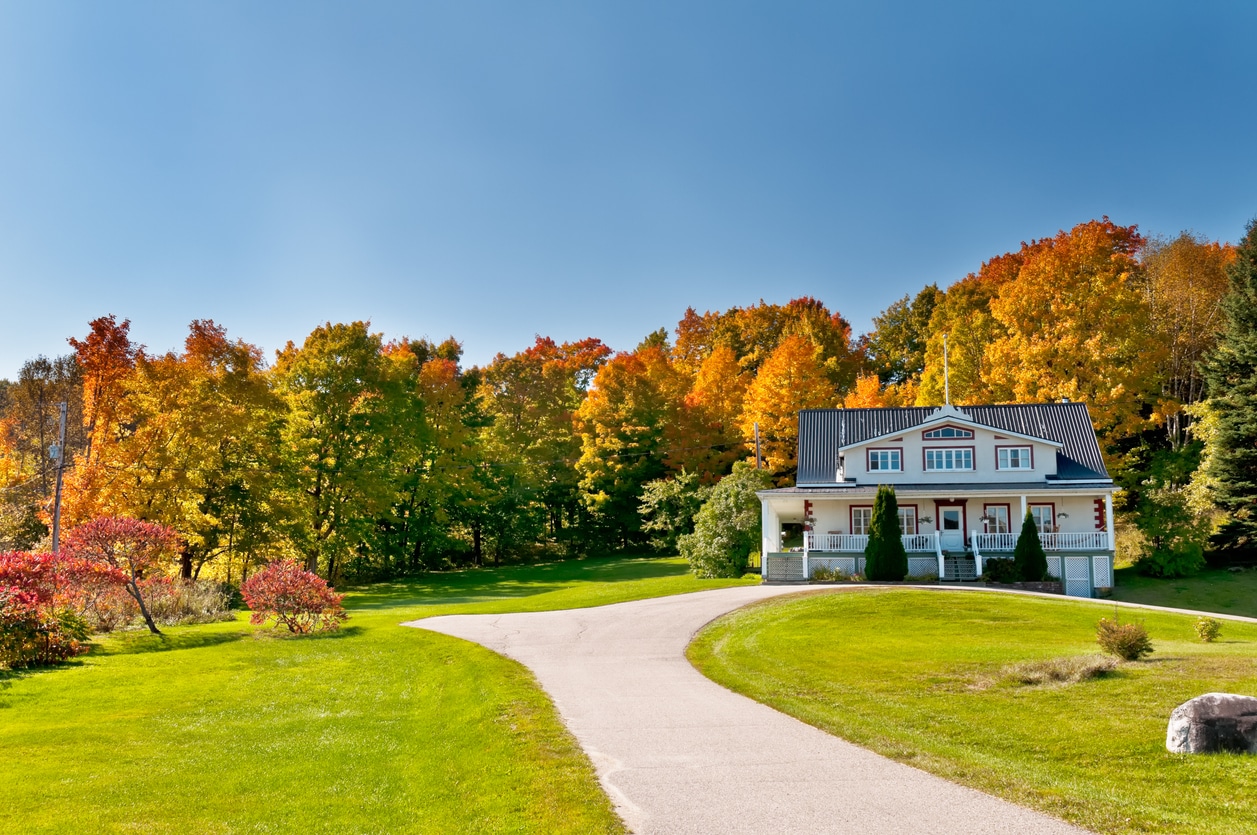So, you’ve set your sights on a slice of the Great White North—maybe a Toronto condo, a Vancouver townhouse, or a lakeside cottage near Montreal. Real estate in Canada still feels like a safe bet, even when prices make your eyes water and your wallet flinch. But before you start daydreaming about your future Canadian backyard, know this: buying property as an expat is less “add to cart” and more “assemble with 32 forms, a magnifying glass, and possibly a hockey stick.”
This guide walks you through what to expect—financing, legal hoops, hidden costs, and those all-important CRA rules. Ready to buy property in Canada without getting blindsided? Let’s make sure you do it right.
📋 Key Updates for 2026
- Toronto now charges a 10% Municipal Non-Resident Speculation Tax on foreign buyers, on top of Ontario’s 25% tax.
- Canada’s federal ban on most foreign home purchases is extended through January 1, 2027.
- In a major policy reversal, the government canceled the proposed increase in the capital gains inclusion rate. It remains at 50% for all capital gains, a massive win for property owners compared to the 67% rate that was feared.
Can Americans buy property in Canada?
Yes, Americans can buy property in Canada, but it’s not exactly “browse Zillow, book a flight, and move in.” Recent Canadian government rules, including the Prohibition on the Purchase of Residential Property by Non-Canadians Act, block most foreign buyers from purchasing homes in Census Metropolitan Areas (CMAs) and Census Agglomerations (CAs)—effectively any town with a core population over 10,000. However, truly rural or recreational properties outside these zones remain fair game.
- Province matters: British Columbia and Quebec pile on their own rules, extra property taxes, and foreign buyer restrictions.
- Financing reality: Most non-residents will need a hefty down payment—think 35% or more—plus legal fees, land transfer taxes, and a real estate lawyer in your corner.
- Status counts: If you’re a temporary resident, on a work permit, or have permanent residency, you’ll face fewer roadblocks than if you’re trying to buy as a true foreigner with no ties to Canada. If you are on a work permit, you only need 183 days of validity remaining on your permit at the time of purchase to be exempt from the federal ban.
- Permanent residents: Get the same property-buying privileges as Canadian citizens.
In short: You can buy property in Canada as an American, but the rules are anything but one-size-fits-all—and the smartest move is to get local advice before making your down payment dreams a reality.
What buying property does (and doesn’t) get you
Owning property in Canada opens a few doors, but not always the ones you might hope. Here’s what’s really on the table:
- No residency, no visa, no citizenship: Owning a home in Canada does not give you legal status, a work permit, or a pathway to become a Canadian citizen. You’ll still need to go through the usual immigration channels.
- May help with the bigger picture: Having property can strengthen a future immigration application, show local ties, or make your relocation story more convincing—but it’s not a golden ticket.
- Usage and rental limits: If you’re not a full-time resident, you’ll face restrictions on how often you can stay and what you can do with the property (especially if you want to rent it out).
- Tax and compliance duties: Expect extra attention from the CRA—think closing costs, non-resident taxes, and annual property tax obligations, even if you’re back in the States.
- Get local advice: The rules shift by province and by your immigration status. Talk to a Canadian real estate lawyer or tax advisor before you sign anything (or paint a single wall).
Buying in Canada is a major move—but it’s not a shortcut to living there. Know your limits, get the facts, and enjoy the view…with your paperwork in order.
Choosing where and what to buy
Location, location… decision fatigue. Canada offers everything from glassy condos in Toronto to cozy ski chalets in Quebec’s backcountry. But before you fall for a glossy listing, here’s what actually shapes your search:
Where Americans tend to settle
Vancouver and Toronto top the charts for international buyers—urban buzz, great public infrastructure, and strong expat scenes. Montreal charms with its European flair and (slightly) softer prices. If you’re after slower living or second-home vibes, British Columbia’s interior and Quebec’s ski towns have a growing fanbase. Vacation homes in Ontario’s cottage country are also a perennial favorite.
What impacts price (and sanity)
- Property value: Detached home, sleek condo, lakeside cabin—all come with different price tags, taxes, and paperwork.
- Market trends: Mortgage rates, government policy, and shifting demand mean prices rise and fall (sometimes dramatically) depending on region and season.
- Neighborhood quirks: School zones, public transport, distance to a decent bagel, and access to financial institutions will shape both daily life and resale value.
Get local insight
Don’t rely on Google Maps alone. A smart local realtor will clue you in on up-and-coming neighborhoods, help you navigate bank rules, and flag hidden costs before you get attached to that “bargain” fixer-upper.
💡 Pro Tip:
The Canadian real estate market is as varied as the country itself—take your time, compare regions, and don’t be afraid to ask a thousand questions before you sign on the dotted line.
Financing your Canadian property
Thinking about swapping your U.S. mortgage for a Canadian one? Be prepared: Canada’s lending game comes with its own playbook, stricter rules, and a down payment requirement that might make your wallet sweat.
Here’s how Americans can (actually) get a mortgage in Canada:
- Down payment: Most Canadian banks require non-residents to put down at least 35% of the purchase price. Permanent residents or citizens? You might get away with 5–20%. But for Americans with no status, assume 35% is your magic number.
- Bank account: You’ll need to open a Canadian bank account and move some cash north. Many lenders won’t consider your application otherwise.
- Financial records: Canadian lenders will scrutinize your U.S. tax returns (usually 2+ years), credit report, income statements, and employment letters. Freelancers/self-employed? Be ready for more questions and more paperwork.
- Proof of funds: You’ll need to show that the down payment and closing costs are already sitting in your Canadian account—no “I promise to wire it later” deals.
- Mortgage options: Both fixed and variable rates are available, but non-residents may face higher interest rates and fewer lender choices. Shop around—and don’t expect a 30-year fixed to be the norm.
- Mortgage brokers: A broker who specializes in expat and non-resident buyers can help you compare options, gather documentation, and avoid rookie mistakes. They’re often worth their fee in sanity alone.
- Lender restrictions: Some major Canadian banks (like RBC, TD, BMO, Scotiabank) are “expat-friendly,” but many small lenders won’t work with foreign buyers at all.
- Pre-approval process: Start early—pre-approval can take longer for U.S. citizens, especially if you’re juggling cross-border income and multiple currencies.
Remember, Canadian mortgage approval is usually based on your ability to pay, not just your credit score—so stable income, low debt, and plenty of cash on hand will help your odds.
💡 Pro Tip:
If you’re buying an investment property, the bank will prioritize the rental income the property generates over your personal U.S. salary. It’s no longer just about your credit score; the building itself has to "earn" its keep.
The home buying process: Step-by-step guide
Buying property in Canada as an expat means navigating a process that’s structured, transparent, and—let’s be honest—a bit paperwork-heavy. Here’s what you can expect:
Step 1: Start with the right team
Begin by hiring a licensed real estate agent who specializes in working with expats or foreign buyers. A great agent will help you understand local markets, legal requirements, and any expat-specific hurdles.
Step 2: Get pre-approved (if you need a mortgage)
Before you start touring homes—whether it’s a condo in Toronto or a cabin in the Rockies—secure pre-approval from a Canadian lender. Non-residents typically need a larger down payment (35% is common), a Canadian bank account, and plenty of documentation, including your tax returns and proof of income.
Step 3: Shop, offer, and negotiate
Your agent will help you shortlist properties, arrange viewings (virtual or in-person), and make an offer once you find the right place. Negotiation is standard—so is paying a deposit, usually between 5–10% of the purchase price.
Step 4: Due diligence is key
Once your offer is accepted, you’ll move on to home inspections, appraisals, and a thorough title search to make sure there are no nasty surprises. Many buyers also purchase title insurance for added peace of mind.
Step 5: Closing day
Your lawyer or notary will manage the transfer of funds, handle legal paperwork, and ensure your new property is registered with the provincial land registry. Expect to pay closing costs, legal fees, and any remaining down payment at this stage.
Step 6: Settle in
Once you have the keys, it’s time to set up utilities, register your property tax account, and—if you’re not living there full-time—arrange for property management. Ongoing costs, such as property taxes and maintenance, are part of the deal.
Congratulations, you’re now ready to call yourself a Canadian homeowner—even if you still need GPS to find the nearest Tim Hortons.
💡 Pro Tip:
Mortgage interest isn’t tax-deductible in Canada like it can be in the U.S., so factor that into your long-term cost calculations.
Taxes, fees, and CRA reporting
Buying a home in Canada comes with a host of taxes and reporting obligations—especially if you’re an American or other foreign investor. Here’s what you need to know before signing on the dotted line:
Upfront taxes and fees
- Land transfer tax: Payable in every province (and some cities), based on the purchase price. Toronto, for example, charges a double whammy with city and provincial land transfer taxes.
- Foreign buyer taxes: British Columbia and Ontario hit non-residents with extra taxes (20% in some regions), though exemptions apply for certain work permit holders and permanent residents.
- Legal fees and registration: Budget for real estate lawyer costs, title insurance, and registration fees.
Ongoing obligations
- Property taxes: Billed annually or semi-annually by your local municipality, regardless of where you live.
- Income taxes (if renting): If you rent out your property, you’ll owe Canadian income tax on rental profits and must file an annual return—even if you’re a non-resident.
Reporting and compliance
- CRA requirements: Non-resident owners may need a Canadian tax identification number and must file forms with the Canada Revenue Agency (CRA), especially if you’re renting or later selling.
- Capital gains tax: If you sell your Canadian property, capital gains taxes may apply. The rules (and tax rates) are different for principal residences versus investment or rental properties.
- Withholding rules: The government of Canada requires non-residents selling property to remit a percentage of the sale price until CRA confirms your actual tax liability.
💡 Pro Tip:
Even if you’re a foreign investor or buying your dream cottage as a U.S. expat, missing a filing or fee can trigger costly penalties. Consulting a cross-border tax expert will help you stay compliant—and sleep better at night.
Can I rent it out? And what about long-term immigration?
Owning a Canadian property as an expat or foreign buyer means more options—but not always the ones you hope for. Here’s how it breaks down:
Renting out your Canadian property
- Long-term rentals are generally allowed for non-resident owners across Canada.
- Tax alert: Non-residents must pay a 25% withholding tax to the CRA on gross rental income. To reduce that bill, file a Canadian tax return and claim eligible deductions.
- Short-term rentals (like Airbnb) may be restricted by local regulations, city rules, or even your condo association.
- Property management is a must for most non-residents—keeping you compliant and your tenants happy.
Does property ownership help with immigration?
- Buying property does not provide residency, a work permit, or citizenship—regardless of the purchase price.
- Ownership may help with some business or entrepreneur programs by demonstrating economic ties, but it’s never the deciding factor.
- Pathways to permanent residency still require you to apply through Express Entry, Provincial Nominee Programs, or family sponsorship—not just property investment.
Renting out your Canadian property is possible (and sometimes profitable), but make sure you know the tax rules and local restrictions. For immigration? You’ll need more than a set of house keys—a property purchase alone won’t unlock the Canadian dream.
Is it worth it? The real pros and cons
Buying property in Canada is not for the faint of wallet, but for many U.S. expats, global nomads, or would-be retirees, it’s still a tempting move. Here’s what you need to know before you start measuring for new curtains:
The upsides
- Stable real estate market: Canadian home values in major cities like Toronto and Vancouver have a solid track record—no wild rollercoaster rides (usually).
- Long-term appreciation: Property investments often hold value, especially in high-demand areas.
- Global city access: Enjoy the perks of world-class dining, public transit, and cosmopolitan living in some of the world’s most livable cities.
- Lifestyle upgrade: Clean air, outdoor adventures, universal healthcare, and the ability to say you own a home “north of the wall.”
The downsides
- Sky-high house prices: Prepare for sticker shock—especially in big cities or trendy mountain towns.
- Foreign ownership rules: Recent laws mean non-residents face extra hoops, higher down payments, and sometimes outright bans in certain zones.
- Hefty legal fees and taxes: Between land transfer taxes, legal fees, mortgage payments, and the possible foreign buyer tax, closing costs add up quickly.
- Currency risk: The U.S. dollar and Canadian dollar don’t always play nicely together—fluctuations can hit your investment value or monthly costs.
Who is this really for?
- High-income expats and future immigrants: Those with a long-term plan (and deep pockets) are most likely to benefit.
- Cross-border retirees: Want a home base for summers in Canada? This can be a lifestyle win—if you plan and budget for taxes.
Risk factors to watch
- Changing regulations: Canadian real estate investment rules and taxes can shift with little warning.
- Tax surprises: From rental income to capital gains, know the tax treatment before you sign anything.
- Market cooling: Not every region is booming; research your type of property and local market before you buy.
Welcome to the (Canadian) club
Buying property in Canada as an expat is part opportunity, part obstacle course—never boring, always full of fine print, and occasionally requiring both a tax expert and a snow shovel. If you’re ready to take the plunge, don’t let cross-border tax rules trip you up.
Bright!Tax is here to help you handle all the U.S. and Canadian tax complexities that come with buying your new home, so you can focus on enjoying your move (and maybe even your first Canadian winter). Get in touch for expert expat tax support, every step of the way.
Frequently Asked Questions (FAQ)
-
Can Americans (or other foreigners) really buy property in Canada?
Yes—Americans and most foreigners can buy property in Canada, but expect rules and restrictions. Certain provinces (like BC and Ontario) add extra taxes or outright bans on non-resident buyers in some areas. Your immigration status matters, so always check current regulations before you start the paperwork marathon.
-
Does buying property in Canada give me residency or a visa?
Nope. Owning a home doesn’t grant you a visa, work permit, or Canadian residency. You’ll need to qualify for those separately, through Canada’s official immigration pathways.
-
What’s the minimum down payment for non-residents?
Most non-residents will need to put down at least 35% of the purchase price when buying property in Canada. Permanent residents and citizens may qualify for lower minimums, but foreigners usually need more cash upfront.
-
Can I get a mortgage in Canada as a U.S. citizen or non-resident?
Yes, but it’s more involved. You’ll need a Canadian bank account, thorough documentation (tax returns, proof of income, etc.), and may face higher interest rates. Not all banks work with non-resident buyers, so start with “expat-friendly” lenders and consider using a broker.
-
Will I pay extra taxes as a foreign buyer?
Likely, yes. Some provinces and cities charge additional “foreign buyer taxes”—sometimes up to 20% of the property price. Plus, all buyers pay land transfer tax, legal fees, and ongoing property taxes.
-
Can I rent out my property in Canada if I’m not living there?
Generally, yes, but you’ll owe a 25% withholding tax to the CRA on gross rental income (unless you file a return to claim expenses). Local rules may also limit short-term rentals like Airbnb, so double-check city and condo bylaws.
-
Does owning property help me immigrate to Canada?
Not directly. While property ownership can demonstrate “ties” to Canada for some business or entrepreneur programs, it’s not a shortcut to residency, citizenship, or a work permit.
-
What costs should I budget for beyond the purchase price?
Be ready for:
- Land transfer taxes (provincial + city in some places)
- Legal fees and title insurance
- Foreign buyer taxes (in certain provinces)
- Ongoing property taxes and, if renting, income tax filings
- Maintenance and property management if you’re not local
-
How does selling my Canadian property work as a non-resident?
You may owe capital gains tax on any profit, and a portion of your sale proceeds could be withheld until CRA processes your tax forms. Always talk to a cross-border tax advisor before selling.
-
Is buying property in Canada actually worth it for expats?
It depends! If you want a second home, plan to spend significant time in Canada, or see long-term investment value, it can make sense. But weigh the high entry costs, taxes, currency swings, and ever-changing rules before you dive in.

 Connect on LinkedIn
Connect on LinkedIn

